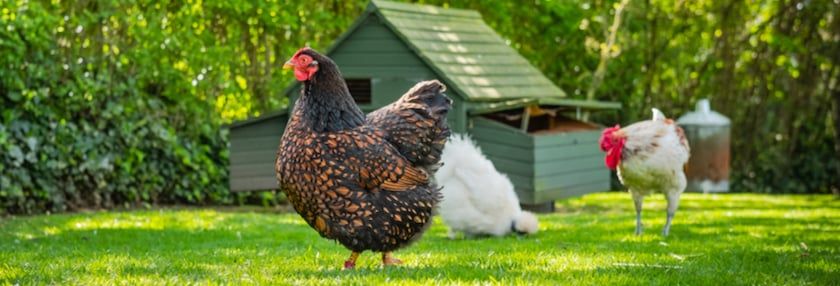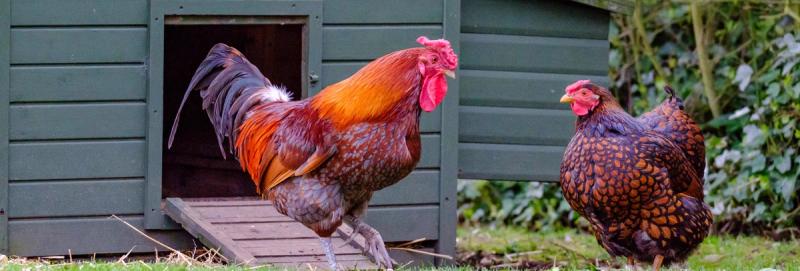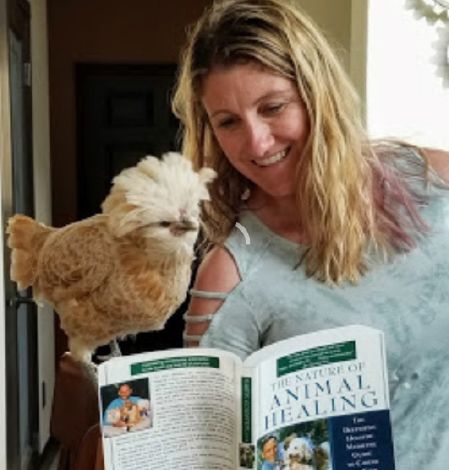Keeping Chickens In Suburbia


City, country, or in-between, consider your neighbors
So, you want to become a backyard chicken parent. You looked into the rules for your county, you either bought or built a lovely coop, you have all the necessities a backyard flock requires… now all you need to do is give your neighbors a heads up.
Wait, what? It’s not really a rule, but it is considered polite to mention to your neighbors your intention of keeping a bunch of feathery, noisy, sometimes smelly and often pest-attracting new pets just a few feet from their property.
To prevent becoming “that neighbor” here are some things to consider when preparing for your new urban flock.
County requirements
First and foremost, be sure that chickens are allowed within your county. Check with your local health and zoning boards (as well as your Home Owners Association, if you live with one) to see if backyard chickens are legal, the allowable number of hens, breed regulations and if roosters are permitted.
Some things to consider when looking into legalities are:
- Livestock Regulations
- Zoning Laws and Allowed Usages
- Health and Sanitation
- Nuisance Laws
- Noise Ordinances
If you are unsure, reach out to your municipality and get a clear answer before buying your chickens or flock supplies.
The coop
Again, be sure you are aware of your county’s requirements on chicken coops. Size, height, distance from a fence or structure, building materials, and substrate are all things to research or gain clarification prior to purchasing. You may also be required to get a permit depending on the size of the coop or if you plan on running electricity or plumbing. Having a clear picture or blueprint can help speed this process along.
The coop itself can make or break neighborly cheer.

Keep in mind the coop location, how easy it is to open for cleaning, proper ventilation, kinds of substrate, etc. Also consider how you plan on disposing of waste. In most circumstances, just a large trash bag is enough to accommodate a week’s worth of chicken poop. Organic-leaning neighbors may even be interested in using the waste as compost.
Do you plan on having a chicken run? Be sure it is secure enough so your hens don’t go sticking their beaks where they don’t belong. I’m sure your neighbor won’t appreciate their prized garden being eaten to bare stalks.
Also, remember that chickens tend to attract pests and predators. Keep their feed securely locked in pest-proof containers and keep their feeding stations and water clean.
The flock
Just like with any other pet, chicken breeds can differ immensely from one breed to another. Some breeds are talkers, some are diggers, some are flighty, some are standoffish…so choose your flock wisely. Do some research to see what breeds fit the bill for your neighborhood.
Are you interested in housing a rooster? See “County Requirements” above—they are often specifically prohibited. If you are allowed to keep a roo, remember that the cartoonish implication they only crow in the morning is false. Roosters crow whenever and where ever they please! They can also be very protective of their hens; you may even consider putting up a “Beware of Rooster” sign so an unaware passerby doesn’t get a surprised by a feathery attack!

Finally, the neighbors
As mentioned above, it is not a rule to inform your neighbors of your plan to keep backyard chickens (unless it states so in your county guidelines), but it is a polite thing to do and will allow you to answer any questions or ease any concerns beforehand.
Chickens are still pretty uncommon pets in suburbia; neighbors may not know what to expect. Educate them and answer any questions they may have. Assure them that you will do everything you can to keep the peace, but chickens are still animals and unpredictable.
If nothing else, the promise of farm-fresh chicken eggs goes a long way in smoothing over ruffled feathers!
Tags:Chicken Chatter

Acreage Life is part of the Catalyst Communications Network publication family.
















